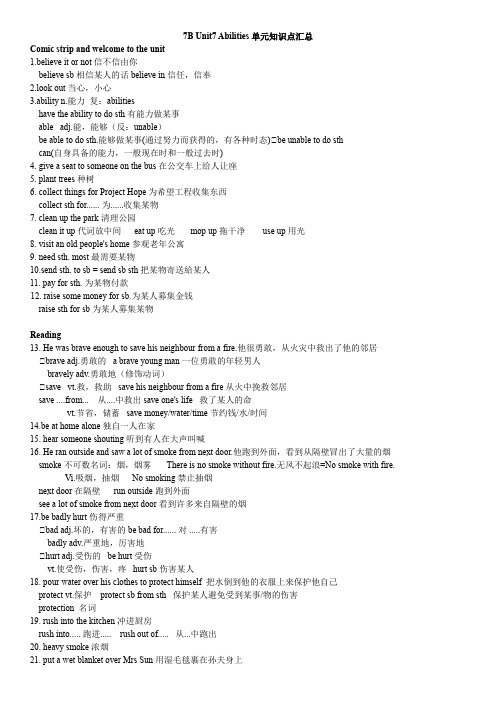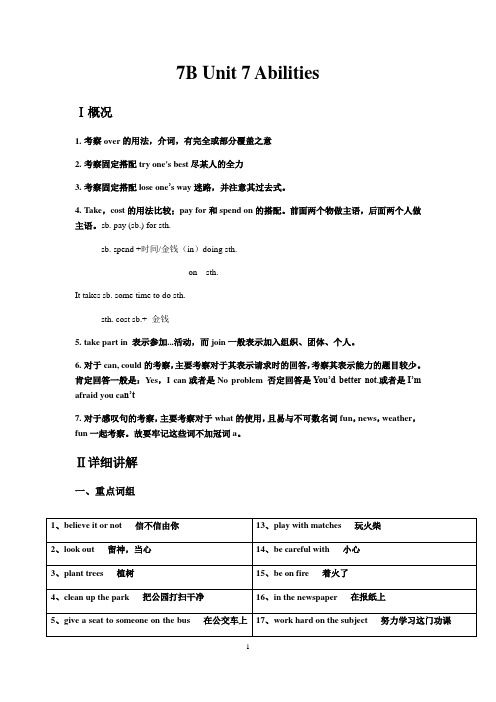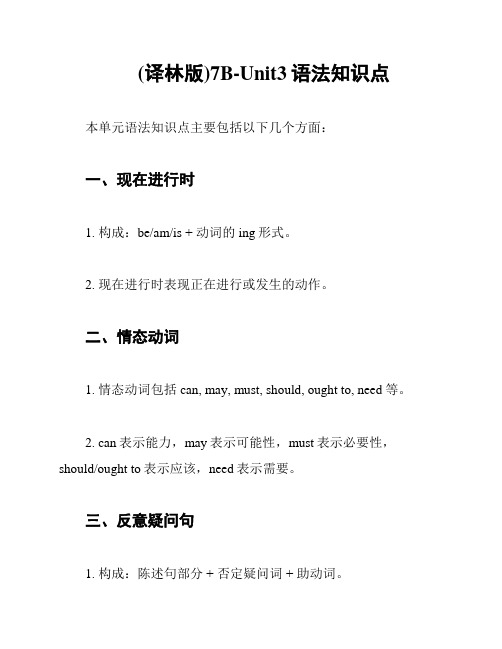7B 知识点
译林牛津版七年级英语下册7B unit4 知识点梳理

7B Unit4 <重点短语>1.have to 不得不,必须2.go straight on 一直往前走3.lie down all day long 整天躺着4.walk along 沿着...走5.turn left 向左转6.cross the bridge过桥7.walk past步行经过8.traffic lights 红绿灯9.plenty of大量,足够10.the way to 去...的路<重点句型>1.Sunshine Zoo is north of Sunshine Middle School.阳光动物园在阳光中学的北面。
2.--How will we get there?我们将怎样到那里?--We’ll get there by bus.我们将乘公共汽车到那里。
3.Go straight on, and you’ll find the Panda House.一直向前走,你们就会看到熊猫馆。
4.Remember that they are dangerous.记住它们很危险。
5.Birds make beautiful sounds when they sing.鸟儿在唱歌时会发出美妙的声音。
6.They jump around and make people laugh.它们上蹿下跳,惹得人们大笑。
7.Cross the bridge, and you will see the elephants.过了桥,你们会看到大象。
8.The food is above the drinks.食物在饮料的上方。
9.Walk past the house, turn left and walk along the path next to the river.走过这座房子,向左转,沿着河边的小路走。
10.The treasure is under the ground in front of the third tree on the left.宝藏在左边第三棵树前面的地下。
译林版7BU6 outdoor funn知识点讲解+练习

7B Unit 6 Outdoor fun1.This bag is too heavy.这个包太重了。
( too表示太,too+adj/ adv)too many +可复too much +不可数much too =too +adj/ adv2. You complain too much .你抱怨太多。
complain V. complain to sb about/of sthcomplaint n.名词3. What do you like about camping?=Why do you like camping?4.She saw a white rabbit in a coat passing by.他看见一只穿着外套的白兔子经过。
See sb do sth 看见某人做过/经常做某事See sb doing sth 看见某人正在做某事Watch/notice/hear与see 的用法一致。
5.She found herself alone in a long,low hall. 她发现她自己独自在一个又长又低的大厅里。
find sb/sth +adj/介词词组find it adj to do sth6.Alice tried to go through the door。
爱丽丝尝试穿过那扇门。
try on 试穿have a try 试一下try to do sth. 设法做某事try doing sth 尝试做某事try one’s best to do sth 尽某人最大努力做某事另外,try to do sth 的否定结构为try not to do sth. 设法不做某事区别through, across与overthrough 指从某个立体空间内穿过Trains go through the tunnel.across 指从物体的表面穿过。
Please be careful when you go across the road.over 指越过,跨越,从某物的正上方跨越The dog jumped over the chair.1、He practiced playing volleyball with his friend.(P74)practice doing sth. 练习做某事We should practice speaking English every day.2、He did some shopping with her mum yesterday afternoon.(P74)do some +doing 结构常表示一些笼统而不明指的事do some reading 阅读do some cleaning 打扫卫生do some cooking 烹饪do some washing 洗衣服3、We put up our tent near a lake.(P74)put up 为建造,搭起,还可意为挂起,张贴;举起,抬起put on 穿上put off 推迟put away 收拾put out 扑灭7.Mozi used bamboo to make kites. 墨子用竹子去做风筝。
NSE 7B M5 知识点

★take主要指花费时间,其常见结构为:
It takes sb. some time to do sth.,it在此作
形式主语,真正的主语是后面的不定式to
do sth.。
2. receive作动词,意为“收到、接到(信 件、礼物、电话等)”,后面可直接跟名 词。常用句型:receive sth. (from sb.) 3. One of+复数名词或代词“……中的一个”,后
like to buy… / I’d like to see… / Could I have a
look at …?
▲
2. try sth. on = try on sth. “试穿”宾语sth. 为
代词时只能位于中间即try it/them on
3. Everything is half price.
1. First, you choose something…and pay
for it. 首先,你选择某物……然后付款。
Second, shopping usually takes a lot of
time. 其次,去实体店购物通常需要花费很多 时间。
…and spend a lot…or save money. ……并且花很多的钱,或省一些钱。 pay, spend, take都有花费的意思, 具体用法如下:
(多久)
多长(长度) How long is the river?
How often 多久(频率) How often do you visit your
grandmother?
How soon 多快(时间) How soon will he be back?
7B Unit6知识点梳理及拓展

牛津英语7B Unit6知识点梳理及拓展1. outdoor fun户外趣事(1).同义词为outside(外部的) 反义词indoor室内的[拓展]outdoor常构成固定短语:outdoor activities 室外活动outdoor life 野外生活outdoor exercises 户外运动(2).fun 的短语:have fun doing sth. tell funny jokes2. Hurry up, Eddie.赶快,埃迪。
考点:掌握hurry作名词与动词在句中的转换。
hurry 此处用作不及物动词,意为“匆忙;急忙”。
其过去式为hurried。
(1)"hurry to+地点”意为“急忙去某地”,(2)hurry to do sth.=do sth in a hurry意为“匆忙做某事”[拓展] hurry也可用作名词,意为“匆忙;急忙”in a hurry匆忙,急忙;in no hurry 不用着急,慢点3. complain too much 抱怨太多[拓展]complain 的用法complain about sth. 抱怨某事;complain about doing sth. 抱怨做某事complain to sb. of/ about sth.向某人抱怨某事练习:他经常跟我抱怨。
He often _______________ me.他对这家餐厅的食物不满。
He ____________ the food in the restaurant.[拓展]too much用法(1)后+ 不可数名词,译为“太多”;(2)修饰动词,放在被修饰词后面区别:much too太……修饰adj/adv 放在被修饰词的前面too many太多……修饰可数名词复数,放在被修饰词的前面助记too much, much too与too many ,too much, much too,用法区别看后头。
7B Unit7 Abilities单元知识点汇总

7B Unit7 Abilities单元知识点汇总Comic strip and welcome to the unit1.believe it or not信不信由你believe sb相信某人的话believe in信任,信奉2.look out当心,小心3.ability n.能力复:abilitieshave the ability to do sth有能力做某事able adj.能,能够(反:unable)be able to do sth.能够做某事(通过努力而获得的,有各种时态)➡be unable to do sthcan(自身具备的能力,一般现在时和一般过去时)4.give a seat to someone on the bus在公交车上给人让座5.plant trees种树6.collect things for Project Hope为希望工程收集东西collect sth for......为......收集某物7.clean up the park清理公园clean it up代词放中间eat up吃光mop up拖干净use up用光8.visit an old people's home参观老年公寓9.need sth. most最需要某物10.send sth. to sb= send sb sth把某物寄送給某人11.pay for sth.为某物付款12.raise some money for sb.为某人募集金钱raise sth for sb为某人募集某物Reading13.He was brave enough to save his neighbour from a fire.他很勇敢,从火灾中救出了他的邻居➡brave adj.勇敢的 a brave young man一位勇敢的年轻男人bravely adv.勇敢地(修饰动词)➡save vt.救,救助save his neighbour from a fire从火中挽救邻居save ....from... 从....中救出save one's life 救了某人的命vt.节省,储蓄save money/water/time节约钱/水/时间14.be at home alone独自一人在家15.hear someone shouting听到有人在大声叫喊16.He ran outside and saw a lot of smoke from next door.他跑到外面,看到从隔壁冒出了大量的烟smoke不可数名词:烟,烟雾There is no smoke without fire.无风不起浪=No smoke with fire.Vi.吸烟,抽烟No smoking禁止抽烟next door在隔壁run outside跑到外面see a lot of smoke from next door看到许多来自隔壁的烟17.be badly hurt伤得严重➡bad adj.坏的,有害的be bad for......对.....有害badly adv.严重地,厉害地➡hurt adj.受伤的be hurt受伤vt.使受伤,伤害,疼hurt sb伤害某人18.pour water over his clothes to protect himself把水倒到他的衣服上来保护他自己protect vt.保护protect sb from sth保护某人避免受到某事/物的伤害protection 名词19.rush into the kitchen冲进厨房rush into.....跑进.....rush out of..... 从...中跑出20.heavy smoke浓烟21.put a wet blanket over Mrs Sun用湿毛毯裹在孙夫身上22.help her out帮助地出来help sb out帮助某人摆脱困境23.put out the fire扑灭火put out扑灭24.burn one's arms烧伤了某人的胳膊burn-burned/burnt25.be in hospital for two weeks住院两周in hospital住院in the hospital在医院里26.at that moment= just then就在那时27.have time to think about sth.有时间思考某事28.nod vi.点头过去式:nodded 现在分词:nodding29.be careful with sth.小心某物be careful with fireworks当心烟花care vt.关心careful adj.仔细的,认真的,小心的careless --be careless粗心carefully adv.细心地,认真地,小心地30.stop sb. from doing sth.阻止某人做菜事31.hear about the news听说这个新闻news不可数名词:消息,新闻 a piece of news一则新闻No news is good news.没消息就是好消息32.Sth be on fire= sth catch a fire着火33.play with matches玩火柴match n.(可数)火柴/比赛vt.相配match sth well与....很配34.keep your hair from the fire使你的头发远离火keep sb. away from sth.使某人远离某物Grammar35.make a call on your mobile用你的手机打个电话36.leave sth. at home把某物落(忘)在家37.burn things with his eyes用他的眼睛烧东西38.hear things far away听到远处的东西39.What else can he do?他还能做什么?else adv.另外,其他通常放在特殊疑问词what/ who /which /when /where/ how等后面,或者放在something/ anything /nothing /anyone/ everyone等不定代词后other adj.其他的,别的后接名词40.fly as fast as light飞得像光一祥快41.情态动词➡定义:情态动词是一类用于表示说话人的语气和情态的助动词。
7B Unit7知识点梳理以及考点

7B Unit 7 AbilitiesⅠ概况1.考察over的用法,介词,有完全或部分覆盖之意2.考察固定搭配try one's best尽某人的全力3.考察固定搭配lose one’s way迷路,并注意其过去式。
4.Take,cost的用法比较;pay for和spend on的搭配。
前面两个物做主语,后面两个人做主语。
sb. pay (sb.) for sth.sb. spend +时间/金钱(in)doing sth.on sth.It takes sb. some time to do sth.sth. cost sb.+ 金钱5.take part in 表示参加...活动,而join一般表示加入组织、团体、个人。
6.对于can, could的考察,主要考察对于其表示请求时的回答,考察其表示能力的题目较少。
肯定回答一般是:Y es,I can或者是No problem 否定回答是You’d better not.或者是I’m afraid you ca n’t7.对于感叹句的考察,主要考察对于what的使用,且易与不可数名词fun,news,weather,fun一起考察。
故要牢记这些词不加冠词a。
Ⅱ详细讲解一、重点词组二、重要句型1、Believe it or not! 信不信由你!belive/think后可接that引导的宾语从句,当主语为第一人称,后接否定意义的宾语从句时,需要否定前移。
eg. 我认为他不会通过考试。
正:I don’t think/believe that he can pass the exam.误:I think/believe that he can’t pass the exam.2、We can send some books to them. 我们可以给他们送些书。
(过去式sent)send用作及物动词,意为“寄(信等);发(电报);(派人)送”。
(译林版)7B-Unit3语法知识点

(译林版)7B-Unit3语法知识点
本单元语法知识点主要包括以下几个方面:
一、现在进行时
1. 构成:be/am/is + 动词的ing形式。
2. 现在进行时表现正在进行或发生的动作。
二、情态动词
1. 情态动词包括 can, may, must, should, ought to, need等。
2. can表示能力,may表示可能性,must表示必要性,should/ought to表示应该,need表示需要。
三、反意疑问句
1. 构成:陈述句部分 + 否定疑问词 + 助动词。
2. 如果陈述句为肯定句,则反意疑问句为否定形式;如果陈述句为否定句,则反意疑问句为肯定形式。
3. 当陈述句中含有情态动词时,反意疑问句中的助动词要和情态动词保持一致。
四、一般现在时和现在进行时的区别
1. 一般现在时表示经常或惯性发生的动作或状态。
2. 现在进行时表示正在进行或发生的动作。
五、动词不定式
1. 构成:to + 动词原形。
2. 动词不定式可以作主语、宾语、表语、定语、状语等。
以上是本单元的语法知识点总结,希望同学们认真学习,多做练习,提高英语语言运用能力。
译林版7B期中复习(Unit1-4短语词组句型语法)

译林版7B期中复习(Unit1-4短语词组句型语法)7B知识点总结Unit 1 Dream homes一、词汇短语1.dream n/v:dream to do sth 梦想做某事;dream of…梦到…2. next to prep.在…旁边,仅次于=beside=near3. capital n/adj: 大写字母,资本/大写的,顶好的;the capital of …的首都(省会)4. have fun=have a good time=enjoy oneself 玩的开心have fun (in) doing sth5. enjoy a cup of tea 喝杯茶6. in the centre of 在…的中心7. share vt/n 合用,分享;份,份额share sth with sb; a share of 一份…8. ▲own adj/vt自己的; 拥有(owner n 拥有者) of one’s own 属于某人自己的;on one’s own=alone 独自的9. on the seventh floor 在第七层10. look out at 向外眺望;look out=be careful 小心,当心;look out of 从…向外看11. be different from 与…不同be the same as 与…相同12. be full of =be filled with 满是…13. some day 将来有一天,总有一天14. call v/n 打电话,拜访call sb=telephone sb=ring sb;give sb. a call=call sbcall sb back 回电话call on sb拜访某人;call at s.p参观某地15. message n.可数名词“消息,讯息”take a message稍口信leave a message 留口信16. at the foot of 在…脚下17. more than=over 多于…18.在足球场on the football field 在羽毛球场on the badminton court在游泳池里in the swimming pool19. invite vt邀请invite sb. to do sth ;invite sb to +地点/场合invitation n.二、重点句型1. Would you like sth/to do…? 肯定回答Yes,I’d love/like to ;否定回答No,thanks;Yes,I’d like to,but2. 电话用语(1)“电话问候”Hello/Hi; see you/bye/goodbye(2)找人May/Can I speak to…, please?或I’d like to speak to…, please?(3)请问您是哪位?Who’s calling? /Who’s speaking? /Who’s that?(4)自报家门如果你就是对方要找的人,那么你可以说:Speaking./This is…speaking.(5)稍等片刻Hold on,please./Wait a minute, please./One moment, please.(6)转告某人接电话There’s a telephone call for you, Amy./You’re wanted on the phone.(7)找不到接听的人,告知对方I’m afraid he/ she is n ot here at the moment.I’m sorry he/ she is out at the moment.主动相助Can I take a message?3. have an area of 数字+单位=be 数字+单位in size/area 意为“有…面积”三、语法A 基数词-数量(1)21~99之间的各数词,在十位数和个位数之间加连字符“-”。
- 1、下载文档前请自行甄别文档内容的完整性,平台不提供额外的编辑、内容补充、找答案等附加服务。
- 2、"仅部分预览"的文档,不可在线预览部分如存在完整性等问题,可反馈申请退款(可完整预览的文档不适用该条件!)。
- 3、如文档侵犯您的权益,请联系客服反馈,我们会尽快为您处理(人工客服工作时间:9:00-18:30)。
7B U1 RevisionI. words1) guide(n.) 指南, a travel guide; 向导,a tourist guide guide(v.)指导2) tour(n.)旅游 --- tourist(n.)游客3) orient(n.)东方--- oriental(a.)东方的4) know(v.)--- known(a.)—knowledge(n.)知识5) surprise(v.& n.)--- surprised(a.)吃惊的 --- surprising(a.)令人惊奇的a surprise party6) observe(v.)观察---observatory(n.)天文观察台7) float(v.) 漂浮--- floating(a.)浮动的8) sightsee(v.) --- sightseeing(n.)观光9) decide(v.)—decision (n.)决定10) suggest(v.)---suggestion(n.) 建议(可数)II.the phrases.1) write/design a travel guide2) make some tour suggestions3) take part in = join in 参加(活动);join 参加(团体或组织)4) interesting places = places of interest5) People’s Square6) Yu Garden7) Suzhou Creek8) the Bund9) Shanghai Grand Theatre10) Shanghai Botanical Gardens11) Longhua Temple12) Yangpu Bridge13) Oriental Pearl TV Tower14) Century Park15) Shanghai Science and Technology Museum16) Shanghai Wild Animal Park17) Dongping National Forest Park18) Sheshan State Resort19) Grand Gateway Plaza20) see the beautiful fountains and pigeons21) eat different local snacks22) buy things in large department stores23) in the center24) in the east/west/south/north25) in the south-east /south-west /north-east /north-west26) on Chongming Island27) get on/along with进展;相处How are you getting on with your project? I get along well with them.28) an interesting city29) be famous for = be known for 因……而闻名30) be famous as = be known as 被认为;誉为……31) its night view32) one of the largest cities33) a shopping paradise34) a huge open area with green grass…35) many new buildings around the square36) about 30 km south-west of the city37) go there for sightseeing and fun38) a contents page39) a famous church40) an observatory41) Huangpu River cruises42) floating restaurants43) add some information to her travel guide44) introduce tourists to some interesting places45) think of 想出,考虑 think of more suggestions; think of others first46) think about 考虑(某事的可能性)think about starting a novel47) think out (通过思考)设计出 think out a plan48) think over 仔细考虑 think it overIII: Review the grammar and structures.1) ---Where can tourists go in Shanghai?---They can go to_____(place).2) ---What can they do there?---They can see/eat/buy/visit…3) It’s not surprising that many tourists come to visit Shanghai every year to shop!(it做形式主语,指代that引导的主语从句)4) It’s convenient to travel between Pudong and Puxi.(it做形式主语,动词不定式“to do”做真正主语)5) If you go to____tomorrow, you will/can…条件状语从句6) Can you tell me if they will win tomorrow?宾语从句U2 RevisionI. Words.1). act(v.)行动,表演---actor(n.)男演员---actress(n.)女演员---action(n.)动作--- activity(n.)活动We have all kinds of activities after class.He was caught in the act of stealing a bike.正在做。
时候2). Excited(more---,most---)----excited—exciting—excitement(n.)兴奋3). rob(v.)抢劫---robber(n.) 盗贼 --- robbery(n.)抢劫案rob sb. of sth. 抢劫某人某物:robbed me of my watch 抢了我的钱The robbers were caught yesterday.I heard there were 3 robberies here4). adventure(n.)冒险---adventurer(n.)冒险家5). prince(n.)王子---princess(n.)公主6). during(prep.)在……期间 --- duration(n.)持续时间7). laugh(v.)笑---laughter(n.)笑声8). altogether=in all 总共9). diary日记, 日志;(工作日程)记事簿区别:dairy 奶制品II. Phrases. (写出汉语意思)1). read a film guide2). discuss which film to see3). take a look at…4). different types/kinds of films: love stories, cowboy stories, action film s, cartoons, adventures, funny films, police stories, horror films5). an action film6). an adventure7). about policemen and robbers8). a swan princess and a prince9). the greatest cartoon of the year10). the most interesting film of the year11). about stupid clowns in the circus12). be full of = be filled with=be crowded with13). full of laughter and fun14). a great adventure about astronauts in space15). Don’t miss the cartoon.16). in a small town far away17). the children’s diaries from Saturday18). pay 80 yuan for the tickets复习:pay (-paid-paid): pay+钱+for+物/事.,19). spend 80 yuan on the tickets复习: spend (-spent-spent): spent+钱+on/doing+物/事.20). (the tickets) cost 80 yuan: 物品+cost +人+钱21). the way to the cinemathe answer to the questionthe key to the door22). listen to her instructions【instruct(v.)指示—instructions(n.)说明】23). draw the route on the map24). turn left/right into…转进25). turn left/right at…在…右/左转26). walk along…27). on your left/right28). 表示街道名称的专有名词:Garden Drive, Sea Avenue, Green Street, Wood Lan e, Market Way…(首字母大写)7bu3RevisionStep 1: Answer the following questions according to the text.1). What’s Kitty’s father’s job?2). What does he do?3). How long has he been a policeman?4). What’s Lucy’s mother’s job?5). What does she do?6). How long has she been an architect?7). What does a coach do?8). What does a headmaster do?9). What has Lucy bought?10). What is a watch used to do/for?11). What has Simon bought?12). What is a key ring used to do/for?13). What is a cable car used for?14). How long have Lucy and Simon been in Garden City?15). How did they go to the top of the a hill?Step 2: Review the words.1). wait(v.)---waiter(n.)---waitress(n.)2). train(v.)训练,培训(n.)火车trainer—运动鞋,教练员,教员—training n.培训3). Fantastic(adj.)极好的,富于想象的---Fantasy(n.)幻想4). Coach5). Architect---architecture6). Wonder—wonderful(ly)Step 3: Review the phrases.1). the Li family –the Lis2). quite a few years3). catch thieves4). help keep the city safe5). work in a company6). draw plans of buildings7). design machines8). bring food to people9). grow vegetables in fields10). type letters and answer the phone11). deliver lettersdeliver(v.) ----delivery(n.)12). train someone in sport13). be in charge of = take charge of 人做主语A headmaster is in charge of a school.A headmaster takes charge of a school.事物+ Be in the charge ofThe school is in the charge of Mr.Li.14). tell the time15). a key ring16). hold the key17). be used to do= be used for doing18). take the cable car19). to the top of a hill20). carry people up a hill21). the view from the top of the hill22). have a good time=enjoy oneself=have a lot of fun=enjoy every minute of …Step 4: Review the grammar and structures.1). About jobs:S1: What’s ______’s job?S2: He/She is a/an _______.S1: What does he/she usually do?S2: ….S1: How long has he/she been a/an ______?S2: He/She has been a/an ______ since/for _____.(since 1990, since she was five, for 10 years)2). About uses:What is it used to do? It is used to do….What is it used for doing? It is used for doing….What do we use it to do? We use it to do….What do we use it for? We use it for doing….Step 5: Translation.1、自2004年以来,伟明叔叔一直做工程师。
